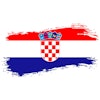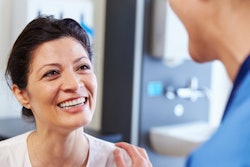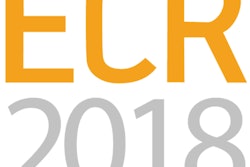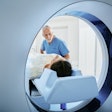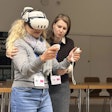
A counseling service in an Italian imaging center has produced high patient satisfaction. The service offers patients one-to-one interviews with radiologists to have their results explained clearly. The service also helps to generate more patient history, which can improve radiology reporting.
 Dr. Francesca Rigiroli.
Dr. Francesca Rigiroli.The service started in September 2015 with 215 patients counseled in the initial three-month pilot phase. Of these patients, 60% were younger than 60. Radiologists set aside an hour a week for meeting patients to discuss their results and answer questions. Patients usually met the doctor who signed the report, according to Dr. Francesca Rigiroli, resident general and interventional radiologist at the Italian Diagnostic Center in Milan.
"The first 50 patients surveyed in 2015 expressed a high level of satisfaction with the counseling, producing an overall score of 4.5 out of 5 in our five-point scoring system," she told AuntMinnieEurope.com.
She pointed to higher counseling demand for the more complex modalities: From the 215 patients counseled, 48% of appointments were to discuss MRI results, while CT represented 31%, x-rays 14%, and other modalities such as nuclear medicine 7%, according to Rigiroli, who gave a presentation about the service at RSNA 2017.
The survey involved patients answering a questionnaire about their age, sex, satisfaction with the counseling appointment, and the preferred method of communication for normal or pathological findings. In particular, patients had to specify how they preferred to receive the report: at the reception of the radiology department (currently the standard method in use), from their general practitioner, via a phone call with the radiologist, through a meeting with the radiologist, or by email or internet.
In the survey, a strong majority of patients (80%) said they would prefer to receive the radiological report through a meeting with the radiologist, particularly if the report included pathology. Other preferred methods of communication are as follows:
 Results from the patient satisfaction and preferences survey during the pilot counseling service in Milan: The majority of patients were very satisfied with their counseling and preferred to receive results in a meeting with the radiologist. Images courtesy of Dr. Francesca Rigiroli.
Results from the patient satisfaction and preferences survey during the pilot counseling service in Milan: The majority of patients were very satisfied with their counseling and preferred to receive results in a meeting with the radiologist. Images courtesy of Dr. Francesca Rigiroli.There was a tendency among older patients to only want to receive results from the radiologist in person, regardless of findings.
The survey has shed light on several aspects of the service, according to Rigiroli: Counseling can help improve the relationship between the patient and the radiologist, raising patients' trust in the institution and making them more aware of the radiologist's role in their care, particularly when patients have a diagnosis of pathology that necessitates follow-up. The research also has shown in which subspecialties counseling is most needed.
"The service is becoming increasingly popular. The rate of counseling is between 10 and 20 meetings a week, though radiologists sometimes only see one to two patients in their counseling hour. Each meeting averages around 15 to 30 minutes in length," she said.
Patients who come to the center are from both private and public healthcare systems. Some arrive without clinical notes, particularly those who are self-referred. The appointment proves doubly useful when it yields more patient history, allowing the radiologist to modify the report, Rigiroli noted.
"It is important to put the radiologist at the center of patient care. Often we are hidden away behind our computers and the patient doesn't know what we do. It is also important to explain to the patient how we make our diagnosis to prevent legal processes," she added. "Most importantly, counseling fosters trust between patients and institutes and helps them fully understand their diagnosis -- and management."

